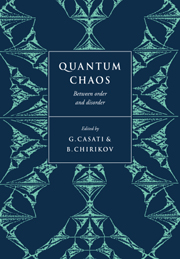Book contents
- Frontmatter
- Contents
- Preface
- Acknowledgments
- Introduction
- Part One Classical chaos and quantum localization
- Part Two Atoms in strong fields
- Localization of classically chaotic diffusion for hydrogen atoms in microwave fields
- Inhibition of quantum transport due to “scars” of unstable periodic orbits
- Rubidium Rydberg atoms in strong fields
- Diamagnetic Rydberg atom: confrontation of calculated and observed spectra
- Semiclassical approximation for the quantum states of a hydrogen atom in a magnetic field near the ionization limit
- The semiclassical helium atom
- Stretched helium: a model for quantum chaos in two-electron atoms
- Part Three Semiclassical approximations
- Part Four Level statistics and random matrix theory
- Index
Localization of classically chaotic diffusion for hydrogen atoms in microwave fields
Published online by Cambridge University Press: 07 May 2010
- Frontmatter
- Contents
- Preface
- Acknowledgments
- Introduction
- Part One Classical chaos and quantum localization
- Part Two Atoms in strong fields
- Localization of classically chaotic diffusion for hydrogen atoms in microwave fields
- Inhibition of quantum transport due to “scars” of unstable periodic orbits
- Rubidium Rydberg atoms in strong fields
- Diamagnetic Rydberg atom: confrontation of calculated and observed spectra
- Semiclassical approximation for the quantum states of a hydrogen atom in a magnetic field near the ionization limit
- The semiclassical helium atom
- Stretched helium: a model for quantum chaos in two-electron atoms
- Part Three Semiclassical approximations
- Part Four Level statistics and random matrix theory
- Index
Summary
New experimental results are presented for short-pulse microwave ionization of highly excited hydrogen atoms. A comparison of these results with quantum numerical computations and analytical predictions provides for the first time experimentally grounded evidence of the localization phenomenon that leads to the suppression of the quantum version of the chaotic diffusion in action space occurring in the classical limit.
The onset of chaotic motion in externally driven classical systems is a key problem in nonlinear dynamics that is now well understood in its essential aspects. In many physically interesting cases, as the perturbation strength increases beyond some critical value, the system starts absorbing energy in a diffusive way. The question whether “diffusive” excitation processes can take place also in externally driven quantum systems is then a very interesting one for the physics of atoms and molecules in external electromagnetic fields. This is a deep question involving the nature and the validity of the quasiclassical approximation when the underlying classical dynamics is chaotic.
The question of “quantum diffusion” was first addressed in a simple model system, the kicked rotator. It was chosen because the features of classical chaos in it were relatively clean and well understood. Besides that, the numerical simulation of its quantum dynamics could be easily accomplished. The major indication of this model was that quantum mechanics suppresses the classical chaotic diffusion in action via a destructive interference effect similar to that responsible for the Anderson localization well known in condensed matter physics.
Information
- Type
- Chapter
- Information
- Quantum ChaosBetween Order and Disorder, pp. 237 - 240Publisher: Cambridge University PressPrint publication year: 1995
